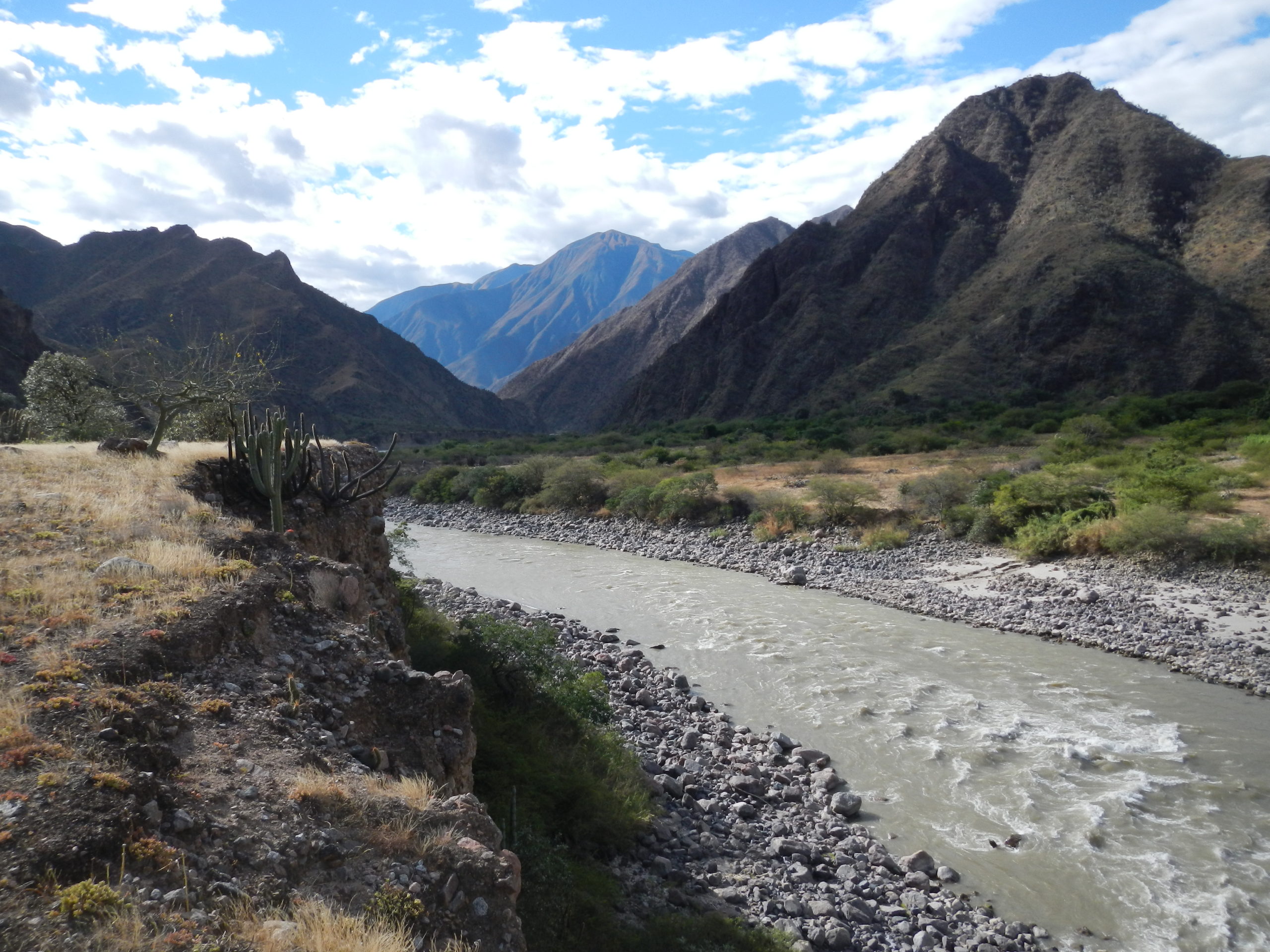
FOR IMMEDIATE RELEASE: July 12th, 2021
Contacts: Constanza Prieto Figelist (cpfigelist@earthlaw.org, +1 202-621-3877), Monti Aguirre (monti@internationalrivers.org, +1 707-591-1220)
Lima, Peru—On July 5th, a coalition of international organizations filed an Amicus Curiae brief before the Celendín Court of Justice, Civil Court, requesting the recognition of the inherent rights of the Marañón River associated with the exercise of the biocultural rights of the indigenous communities that live in the basin. On September 28, 2018, the representatives of three communities of the Celendín Province with the legal support of Earthrights International (ERI) and the Institute of Legal Defense (ILD), filed a petition requesting that the resolution approving the EIA of the Chadín II Hydroelectric project be declared null and void and the Marañón River be recognized as an entity subject to rights.
The Marañón River is one of the most vast and important bodies of water in Peru. The river is most notable for its rich, native biodiversity, for being one of the most significant tributaries of the Amazon River, and for being home to diverse Amazon indigenous groups in its basin like the Kukama Kukamiria, Awajún, and Wampis, all who have an ancestral and indissoluble relationship with the river. Further, many of the indigenous people, like the riverside communities, depend on the river for transportation and fishing for food and income.
The Marañón River is subject to multiple threats including the cumulative damage of more than 20 hydroelectric projects in the basin. The amicus brief aims to contribute to the constitutional action seeking to challenge the environmental impact assessment that approved the Chadín II Hydroelectric Project. The brief endeavors to demonstrate the incompatibility of the approval of the Chadín II Project with an interpretation of Peru’s Constitution and the International Treaties respectful of the inherent rights of the Marañón River, bringing to light the deficiencies, errors and omissions of the environmental impact assessment. The Peruvian State is internationally obliged to adopt urgent measures for the protection, conservation, regeneration and integral maintenance of the Marañón River in accordance to the recent jurisprudence of the Interamerican Court of Human Rights and their interpretation of the American Convention of Human Rights and the San Salvador Protocol, which is binding for Peru. Finally, the brief aims to guarantee the full exercise of the biocultural rights that indigenous people have in respect of their connection with the Marañón River, in accordance with the Peruvian Constitution, and the international treaties Peru has signed.
“The jurisprudence of the Interamerican Court of Human Rights has imposed to all country members, new standards of interpretation and application of the regional conventions through the issue of the Advisory Opinion Oc-23/17 on November 15, 2017, of which Peru is part. The Peruvian government is called to apply the Rights of Nature, including rejecting unnecessary dam projects that fragment ecosystems and have a negative impact on indigenous territory,” said Constanza Prieto Figelist, Latin American Legal Director of Earth Law Center, which is among the groups that filed the amicus brief. “Today our coalition presented a plan for Peru to enforce the rights of the Marañón River in a substantial and practical manner.”
“Our amicus brief offers the Cajamarca Court of Justice a practical guide to enforce the rights of rivers and all of the ecosystems in practice,” said Monti Aguirre, Latin American Coordinator of International Rivers.
Due to the global climate emergency, which has resulted in water stress and a strong determinant to freshwater sources, many countries have decided to recognize the Rights of Nature, specifically of rivers, propelling legislative reforms with holistic approaches. For example, in Columbia, important court rulings have been passed recognizing the Rights of Nature. As well, in the United States, there are a series of Native American Tribes and local communities that have passed laws, declarations and resolutions concerning the Rights of Nature. In 2021, Canada recognized the Magpie River as subject to rights. Further, the post-2020 global biodiversity framework of the Convention on Biological Diversity has recently promoted the Rights of Nature in the proposal to be adopted later this year.
The global movement seeking to recognize the rights of rivers has rapidly advanced, implementing effective protection and restoration to damaged and threatened basins. In this global context of reform, the Marañón River seeks to integrate this list of natural entities that have their intrinsic rights recognized.
Earth Law Center is a nonprofit organization, with offices in the United States of America, Mexico and Canada that promotes the application of the Rights of Nature at the local and international level, creating alliances with local organizations for the recognition and promulgation of laws that recognize the inherent rights of rivers, oceans and coastal and terrestrial ecosystems. Thus, it seeks to make a paradigm shift, fighting for the formal recognition of the Rights of Nature to exist, thrive and evolve. Earth Law Center seeks to grant ecosystems the same rights that people and corporations have, allowing the defense of their rights before national and international courts, not only for the benefits of people but also, for Nature herself.
International Rivers since 1985, is dedicated to the protection of rivers and defending the rights of communities that depend on them. We work to stop destructive projects in rivers and promote energy and water supply solutions for a sustainable planet. Rivers are vital to sustain life on land. We envision a world where rivers are healthy and the rights of local communities are valued and protected. We visualize a world where water and energy needs are fulfilled without degrading Nature or increasing poverty, and where people have the right to participate in the decisions that affect their lives.
Great Lakes Environmental Law Center is a nonprofit organization based in Detroit, United States, that offers community education and legal support in environmental problems. In addition, Great Lakes Environmental Law Center offers various legal services, regulatory development in relation with environmental issues, natural resources and energy that affect the communities in and around Detroit, Michigan and the region of the Grand Lakes.

